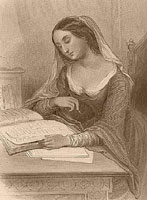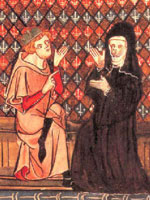|
 Prof. Schulenburg: We actually know very little about Heloise's background. We have the name of her mother from a necrology that lists dead people, and we don't have a name of a father, so she could have been an illegitimate child. We know that she was raised at the convent of Argenteuil which is about six miles outside of Paris. It is then at the age of 17 that she appears on the scene in Paris. Prof. Schulenburg: We actually know very little about Heloise's background. We have the name of her mother from a necrology that lists dead people, and we don't have a name of a father, so she could have been an illegitimate child. We know that she was raised at the convent of Argenteuil which is about six miles outside of Paris. It is then at the age of 17 that she appears on the scene in Paris.
Abelard's background is very interesting. He gave up his position as knight to dedicate himself to learning and study, so from the start he was very much interested in education and learning and teaching. He was a key figure of the twelfth century Renaissance. He was an intellectual giant of the 12th century. He was one of the most original minds of this period, a very daring scholar. In part, the medieval university arose out of his fame as a teacher.
 Emily Auerbach: Why would this learned philosopher and thinker and so on get involved in being a tutor to someone of unknown birth? Emily Auerbach: Why would this learned philosopher and thinker and so on get involved in being a tutor to someone of unknown birth?
Prof. Schulenburg: Abelard tells us in the History of My Calamities that he was attracted to her for her good looks and also for her high learning.
Education for women at this time, this is the twelfth century, was beginning to actually decline. Up to this point there had been a very high level of learning for women in the monasteries. These women were highly educated in the seven liberal arts, and they would call it the trivium and the quadrivium. They would be taught grammar, rhetoric, dialectic which would correspond to the humanities. The four or the quadrivium would be arithmetic, geometry, astronomy and music which would correspond to the sciences. The nuns would learn this in the convents.
They would also have a sound instruction in writing and reading, studying the prophets. They also learned the use of exegetical methods where they could analyze things on various levels. They learned history, chronography, grammar, poetry, and they were especially well learned in the classics, and so Heloise had a very sound education in the seven liberal arts.
 Emily Auerbach: Where does Abelard come into the picture? Emily Auerbach: Where does Abelard come into the picture?
Prof. Schulenburg: : Abelard is this famous scholar, of course, in Paris, a very popular teacher. Uncle Fulbert, an uncle of Heloise, hired him as a private tutor for Heloise. He uses this excuse of convenience to move in with Uncle Fulbert and Heloise.
Norman Gilliland: "I greatly wondered at the man's simplicity. No less was I amazed at myself as if he had committed a tender lamb to a ravenous wolf."
 Prof. Schulenburg: As the teacher, the tutor, here and again the wide difference in ages, Abelard had a great deal of power over Heloise and power to punish her, as was common with students in the Middle Ages. Prof. Schulenburg: As the teacher, the tutor, here and again the wide difference in ages, Abelard had a great deal of power over Heloise and power to punish her, as was common with students in the Middle Ages.
Emily Auerbach: As a tutor, he would have had an excuse to have many close, private meetings with her as well.
Prof. Schulenburg: Exactly. As a private tutor in her home it opened up all sorts of possibilities for him. He doesn't seem to have any qualms in describing in detail all of the steps in this relationship.
 Norman Gilliland:: "We were first joined in a single house and then in soul. Under the pretense of study we gave ourselves entirely to love. The practice of reading offered us the secret hideaways which love desires. With the books open the words dealt more with love than with letters. More were the kisses than the learned opinions. We moved our hands more often to the breast than to the books. More often love turned our eyes upon itself than reading directed them to the text. In order that we might have less of suspicion, love not wrath gave blows. What then, no stage of love escaped our desires. If love could invent some new manner we tried this, too." Norman Gilliland:: "We were first joined in a single house and then in soul. Under the pretense of study we gave ourselves entirely to love. The practice of reading offered us the secret hideaways which love desires. With the books open the words dealt more with love than with letters. More were the kisses than the learned opinions. We moved our hands more often to the breast than to the books. More often love turned our eyes upon itself than reading directed them to the text. In order that we might have less of suspicion, love not wrath gave blows. What then, no stage of love escaped our desires. If love could invent some new manner we tried this, too."
[Continued on page two]
|